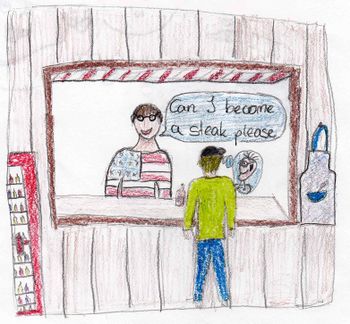Food/Going to a Restaurant: Unterschied zwischen den Versionen
Markierung: Quelltext-Bearbeitung 2017 |
Markierung: Quelltext-Bearbeitung 2017 |
||
| (2 dazwischenliegende Versionen desselben Benutzers werden nicht angezeigt) | |||
| Zeile 57: | Zeile 57: | ||
'''Who does what?''' | '''Who does what?''' | ||
< | <div class="lueckentext-quiz" lang="en"> | ||
The ''manager'' watches over the staff. The ''staff'' are all the people who work here. | The ''manager'' watches over the staff. The ''staff'' are all the people who work here. | ||
| Zeile 72: | Zeile 72: | ||
[[File:Snow City Cafe-cropped.jpg|thumb|400px|"Please wait to be seated"]] | [[File:Snow City Cafe-cropped.jpg|thumb|400px|"Please wait to be seated"]] | ||
1. Put in the verbs in the right form. (All tenses, but no passive) | '''1. Put in the verbs in the right form.''' (All tenses, but no passive) | ||
<div class="lueckentext-quiz" lang="en"> | <div class="lueckentext-quiz" lang="en"> | ||
| Zeile 83: | Zeile 83: | ||
[[Datei:False-Friend.jpg|right|350px|]] | [[Datei:False-Friend.jpg|right|350px|]] | ||
2. Put in the verbs in the right form. | '''2. Put in the verbs in the right form.''' | ||
(All tenses, but no passive; +Adverbien → '''nicht''' für 6.Klasse!) | (All tenses, but no passive; +Adverbien → '''nicht''' für 6.Klasse!) | ||
| Zeile 91: | Zeile 91: | ||
</div> | </div> | ||
3. Put in the verbs in the right forms. (All tenses, [[ | '''3. Put in the verbs in the right forms.''' (All tenses, [[Passive|passive]] or active! → '''nicht''' für 7. Klasse!) | ||
<div class="lueckentext-quiz" lang="en"> | <div class="lueckentext-quiz" lang="en"> | ||
A few minutes later my friend Bob ''got (get)'' the ''biggest (big)'' T-bone steak he ''had ever seen (see, ever)'' . Then he ''was asked (ask) '' by the waiter if everything was ok. | A few minutes later my friend Bob ''got (get)'' the ''biggest (big)'' T-bone steak he ''had ever seen (see, ever)'' . Then he ''was asked (ask) '' by the waiter if everything was ok. | ||
| Zeile 100: | Zeile 100: | ||
</div> | </div> | ||
4. Fill in the correct form of the verb. (all types of [[If-sentences|conditional]] → '''nicht''' für 6.Klasse!) | '''4. Fill in the correct form of the verb.''' (all types of [[If-sentences|conditional]] → '''nicht''' für 6. Klasse! / Ab 7. klasse Unit 3!) | ||
<div class="lueckentext-quiz" lang="en"> | <div class="lueckentext-quiz" lang="en"> | ||
a. If you ''read (read)'' that book carefully, you would understand it. | a. If you ''read (read)'' that book carefully, you would understand it. | ||
| Zeile 110: | Zeile 110: | ||
d. He will be ill if he ''eats(eat)'' too much. | d. He will be ill if he ''eats(eat)'' too much. | ||
</div> | </div> | ||
<div class="lueckentext-quiz" lang="en"> | <div class="lueckentext-quiz" lang="en"> | ||
e. If you eat that much, you ''won't be able to eat|will not be able to eat (not , be able, eat)'' an ice cream as dessert. | e. If you eat that much, you ''won't be able to eat|will not be able to eat (not , be able, eat)'' an ice cream as dessert. | ||
Aktuelle Version vom 10. Dezember 2024, 03:55 Uhr
Eating out (Mediation)
In many countries tourists can buy guide books which will help them to choose the right restaurant. Let's take a look across the Atlantic, for example. Here are two pages from a food guide to the USA.
ROCKY BEACH / California
Señor Pico, at 87 West Drive
Tel.: 270 - 45 26
A friendly Mexican place where the owner welcomes you with a smile almost as wide as his sombrero. There is guitar music in the evening and most of the meals are not too expensive.
Go and try their seafood. It is very good and always fresh from the Pacific. If you don't care for fish, you should choose Senor Pico's 'Chili Con Carne' (beef in red chili sauce). If this is too hot for you, try another one of his Mexican specialties. There are lots of delicious desserts to choose from, too.
Open daily from 11.30 in the morning until 11 in the evening Monday-Saturday and from 4 until 11 on Sundays. Señor Pico's Mexican specialties cost between $ 9.25 and $ 18.70.
ROCKY BEACH / California
City Cafe, at 589 Main Street
Tel.: 625 - 4120
One of the many pizzerias in California, and probably one of the best. The owner, Mr Waters, is an American. Neither he nor his family comes from Italy. If you thought that Americans can only make hamburgers and salads — you're wrong!
The City Cafe is open daily from 11.30 a.m. until midnight. Pizzas cost between $ 8 and $ 15.50. You can choose from many good Californian wines - but watch the prices! Delicious American ice creams for dessert.
Don’t forget to tip your waitress
Tipping is considered by some to be a social custom in restaurants having traditional table service. The customary tip for a restaurant meal in the United States historically ranges from 15 to 20 % of the total bill (before tax) for good to excellent service. Many restaurants include a tip at 18% or more on the bill for groups of 6 or more guests. This should be verified by the customer to avoid double tipping, or if the customer would like to add additional gratuity in the case of excellent service.
With many traditional table service restaurants now offering take-out and curbside service, standards for tipping vary. One source advocates optional tipping. Others say that tipping should be 5-10%. More money may be offered if exceptional service is provided or if the order is particularly difficult.
Tipping at fast food restaurants and coffee places such as Starbucks (where there is no traditional table service), is not necessary, despite the growing number of tip jars (a.k.a. guilt cans) appearing at them.
Benutze die Informationen des Reiseführers um folgende Fragen auf Deutsch zu beantworten
(Antworten in ganzen Sätzen; keine wörtliche Übersetzung nötig!).
- Welche Eigenschaften (2 Einzelheiten) zeichnet das Restaurant Senor Pico aus?
- Welche Spezialitäten werden empfohlen?
- Welche Informationen gibt der Gourmet-Führer über den Eigentümer des City Cafes?
- Was kannst du über das Preisniveau im City Cafe sagen?
- Wie viel Trinkgeld sollte man geben?
- Welche Ausnahme Regelungen gibt es für große Gruppen?
- In welchen Restaurants gibt es kein oder nur wenig Trinkgeld?
Use of English
Jobs in a restaurant
Who does what?
The manager watches over the staff. The staff are all the people who work here.
The chef is someone who prepares + cooks the meals.
A waiter is man who serves the meals and drinks to customers. His female colleagues are waitresses.
A dishwasher is the the guy who washes the dirty pots and plates.
The bartender is someone who prepares + serves drinks at a bar. The bouncer is security personnel who checks people at the door.
Mixed Grammar
1. Put in the verbs in the right form. (All tenses, but no passive)
We went(go) at a good restaurant yesterday after we had read (read) about it in the guide book. Next to the entrance door there was (gab es) a sign which told us to wait to be seated. The waiter came (come), introduced him(???)self as Tom and showed us our table.
We were reading (read) the menu when suddenly Tom came (come) and gave (give) each of us a glass of water.
We told (tell) we wanted to drink (want, drink) something else. He just laughed (laugh) and said (say) that he would take our orders in a minute.
2. Put in the verbs in the right form.
(All tenses, but no passive; +Adverbien → nicht für 6.Klasse!)
We were celebrating|celebrated (celebrate) Bob’s birthday and so Bob asked if he could become a steak. The waiter laughed again loudly (loud) and said “I hope not, Sir”. Then he asked if we wanted to get (bekommen) a steak. We now understood(understand) .
3. Put in the verbs in the right forms. (All tenses, passive or active! → nicht für 7. Klasse!)
A few minutes later my friend Bob got (get) the biggest (big) T-bone steak he had ever seen (see, ever) . Then he was asked (ask) by the waiter if everything was ok.
Bob replied (reply) “The steak was grilled (grill) perfectly by your chef.”
When we finished (finish) all plates and forks were taken (take) back to the kitchen where everything was cleaned|would be cleaned (clean) by the dishwashers.
4. Fill in the correct form of the verb. (all types of conditional → nicht für 6. Klasse! / Ab 7. klasse Unit 3!)
a. If you read (read) that book carefully, you would understand it.
b. If the children are (be) good, they can stay up late.
c. I would order|'d order (order) that seafood dish if it were not so expensive.
d. He will be ill if he eats(eat) too much.
e. If you eat that much, you won't be able to eat|will not be able to eat (not , be able, eat) an ice cream as dessert.
f. If Bob was older, he would have|'d have (have) more sense.
g. If the waiter was (be) friendlier, we’d give him more tip.
h. You will kill|'ll kill (kill) yourself if you always work as hard as that.







